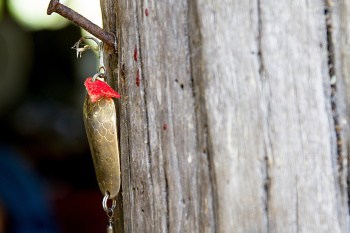
Fishing with a lure is a fantastic way to save money while increasing the chances of catching a large fish for that next fish fry. Finding a fishing lure, however, is even better, but usually they are very dirty and have lost their luster.
Should you clean your fishing lures? It is not necessary to clean a fishing lure; in fact, many fishermen would say not to because it will remove the scent on the lure that fish love. However, cleansing a lure can bring back the original color, texture, and movement that aids in catching large fish.
In this article, we shall examine the pros and cons of cleaning your fishing lures, how doing so affects the lure, and some warnings and precautions when doing so.
The Pros of Cleaning Your Fishing Lures
The fisherman casts out continually and retrieves the lure making it swim or produce popping actions that fish cannot ignore. However, mud, rust, or any number of materials can cling to the lure, making it lose its ability to draw fish to the hook. This is one reason cleaning your lure is advantageous as doing so allows the lure to regain its ability to function properly.
A fishing lure acts as an artificial bait for fishermen that are designed to attract fish. There are diverse types of lures, but they all utilize the same basic qualities, including:
- Movement
- Vibration
- Flash
- Color
Knowing how cleaning a lure benefits the fisherman and aids in catching fish is vital to choose the method of cleaning to be utilized. Below we will examine the four qualities and how cleaning a lure enhances each.
Movement
Lures work best when they retain their movement in the water. If they become clogged with mud or rusty, they cannot attract fish like they once did. Cleaning the lure can help return the movement to the lure allowing for even better fishing and extending the life of the lure.
Vibration
Vibrating lures made from plastic or metal produce a loud, tight vibration when being reeled in through the water. Some lures have built-in sound chambers filled with shot that causes rattling sounds.
If a vibrating lure has become extremely rusty it cannot be effective because the water will not move across it or through the sound chamber well lowering or even eliminating the sounds it makes.
Flash
The flash the lure makes in the water is vital if one is to attract and catch largemouth bass. Many times fishermen will use stinky bait such as old meat to add a scent to the lure to attract large fish.
However, if the hook and lure become filthy from the rotting meat, mud, and blood from the fish, the lure cannot function well and will not flash in the water as it should.
Color
The debate is on as to whether the color of a lure matter to fish as they live underwater and the water disperses light washing out most colors when seen from below. However, many fishermen swear by the idea that the color of lure matters.
What happens then when a fishing lure loses its color?
Some would answer that it makes a minor difference, but others would argue it makes an enormous difference as to whether they can catch the big fish.
The Cons of Cleaning a Fishing Lure
There are very few cons to cleaning a fishing lure, but they are important to consider.
Some fishermen believe that a fishing lure should be left alone until it becomes totally ineffectual because if you clean the lure you remove the smells that fish enjoy.
Many fishermen also believe that changing the coloring of the lure is a disaster for managing their ability to catch fish.
Cleaning a lure may also remove some of the colors, and if it is not dried thoroughly will rust and become a useless piece of plastic and metal.
Four Methods to Cleaning a Fishing Lure
There are as many favorite ways to clean fishing lures as there are fishermen to do it. However, there are some methods that are more popular than others, including these methods that use:
- DW40
- A Magic Eraser
- A Toothbrush and water
- Vinegar and Salt
Below you will find a deeper explanation of some of the most popular methods to clean a fishing lure.
DW40
Soaking rusty lures in DW40 helps loosen and lift away the rust that may be affecting the action of the lure. Simply place the lure in a plastic container and spray liberally with DW40. Let the lure soak for up to twelve hours then wipe the rust off.
It is important to remember that fishing with a lure that is covered with DW40 is illegal. It is, therefore, vital to make sure and wipe all the DW40 from the lure before using it.
Using A Magic Erasure
A Magic Eraser or a generic brand of this type of sponge, and warm water will do an excellent job of removing rust and other filth from a fishing lure. Simply add some degreasing dish soap to the sponge and scrub.
One problem with using this method is that it will leave the lure dull. To replace a glossy look to the lure, simply apply some clear gloss fingernail polish in a light coat.
Using a Toothbrush and Water
To clean a lure to replace the movement it once had, simply wash in warm soapy water using dish soap. Be certain to rinse the lure well so the fish cannot smell it when the lure is used.
By using a soft toothbrush, some baby soap, and some elbow grease, the lure can be restored to its former luster and be made ready for another fishing adventure.
A suggested method of repairing a lure that has lost its color is to use soap and water to remove any residue from the outside and then use either paint or permanent colored markers to replace the color and to design your own lure.
Using Vinegar and Salt
Vinegar and salt are two things most kitchens have lying around that are wonderful for the cleansing of fishing lures.
First, add one-part vinegar to two parts water and add salt to the mixture. Then soak the lures in the solution for around twenty or more hours. After removing the lure from the solution, rinse it well and wipe down with a dry cloth.
Tips and Cautions to Cleaning Lures
While there are plenty of reasons to wish to clean fishing lures, there are some warnings that should be heeded as well when choosing to do so. These tips include all of the following:
- Be careful with old lures that are painted. To keep the original finish and details such as eyes, use a gentle touch and mild soap.
- Some lures are manufactured from metal or aluminum and will wash fine using a normal dishwasher cycle using dishwasher soap
- When using lures made from plastic materials, you don’t need to wash it before using it again. Clean the fly lure by drying the lure after each use
- Beware when using a sponge to clean a lure as the sponge may become entangled with the treble hook on the lure
Obviously, there are different methods and different warnings for each cleaning method. However, cleaning a lure may not be necessary at all. Unless the lure is so rusty and dirty that it cannot move or has become ineffective, leave the lure as is and use it over again, especially if it is catching fish for you.
